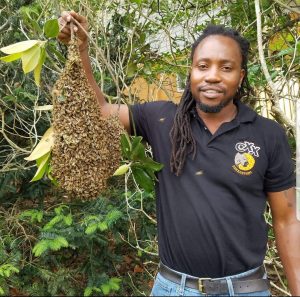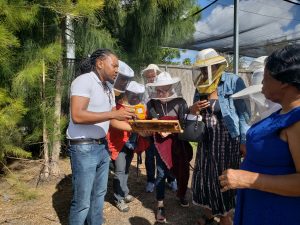Alwyn “Oxx” Simeina: For the Love of Raw Honey

Alwyn “Oxx” Simeina grew up eating raw honey in the U.S. Virgin Islands and has been chasing the taste of a particular “batch” of comb since Hurricane Hugo hit St. Croix and downed a tree that contained a hive within it. “I never could find [the taste again] but I keep trying,” says Oxx and from there, his desire to keep bees grew.
Oxx is a self-taught beekeeper and owner of Oxx Beekeeping in Kissimmee, Florida and he is a big proponent of chemical-free beekeeping. He started his self-education by attending seminars and joining a local beekeepers club and now he provides advice to his local community, including some of his former mentors.
Oxx first started beekeeping about five years ago. He says, “I couldn’t really find any mentors that looked like me,” because everyone in the beekeeping world were mostly older white men. “When I entered my first year, that’s when I decided to just read about [beekeeping] and the science about it, and my mentors were actually women.”
Today, Oxx has about 22 hives and provides classes and seminars to his community. As time progresses, he’s seeing a shift with more people of color and women expressing interest in becoming beekeepers. Kids in the community have expressed a particular affinity for the classes and “the whole concept of people actually taking care of the bees,” says Oxx. “And the …they always get excited about that, I don’t know why.”

Oxx’s approach to beekeeping is to be as natural as possible, encouraging people to study “the natural ways of the bee and imitate that [because] we’re already being unnatural by putting them in a box with frames.” In his hives, Oxx foregoes any chemical treatments and instead uses essential oils like lemongrass, oregano, eucalyptus, and lemon for mite control. He is also looking into the mycelium from mushrooms to help stop the spread of viruses from mites and hive beetles.
In his classes, he explains that when companies come to spray chemicals on the grass, the bees drink the chemically-treated water and get sick. Once people understand the process of this, participants tend to try not to use chemicals and instead go for non-chemical treatments like the water with soap method. Since offering classes, he’s seen a shift in people starting to grow gardens instead of just growing grass.
A major challenge to beekeeping in this urban area is when bees move into people’s houses due to loss of habitat, which is one of the things Oxx is working on in addition to providing classes and seminars. Oxx offers a service to come take care of bees in people’s yards — bee rescues — which can be a trying task. “A lot of times bees don’t survive because they’re in a stressful situation [like] trying to extract them out of a wall.” These are highly stressful situations for the bees, which can weaken them further when infected with pests.
For the future of beekeeping, Oxx really wants to see new beekeepers get away from the treatments. “I would love to see people get away from chemicals and all these treatments, giving the bees sugar water, and be more sustainable,” says Oxx. Oxx teaches beekeepers not to take all of the honey when extracting from the comb if they can help it, take a bit for yourself and leave a little bit of honey for the bees. “Let the bees enjoy their honey,” he says.
Media Attributions
- Alwyn Simeina © Alwyn Simeina is licensed under a All Rights Reserved license
- Alwyn Simeina and community group © Alwyn Simeina is licensed under a All Rights Reserved license
A bee smoker (usually called simply a smoker) is a device used in beekeeping to calm honey bees. It is designed to generate smoke from the smouldering of various fuels.
Varroa destructor (Varroa mite) is an external parasitic mite that attack and feeds on the honey bees Apis cerana and Apis mellifera. The disease caused by the mites is called varroosis. The Varroa mite can only reproduce in a honey bee colony.


Feedback/Errata